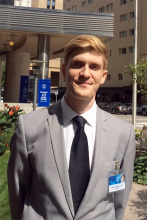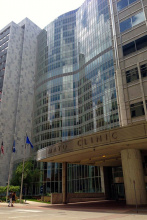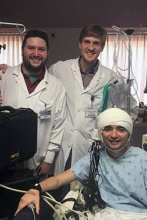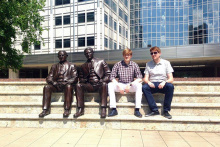Date added: 2020-08-31
How to decode the code of the human mind? Conversation with PhD Michał Kucewicz
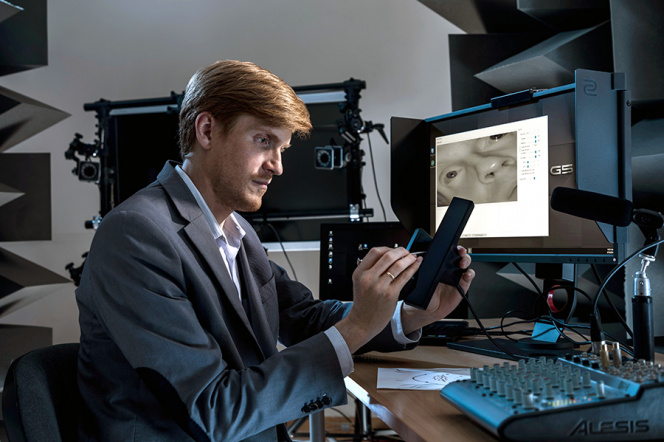
Maciej Dzwonnik, GUT spokesman: Gdańsk ‘Topolówka’, Fahrenheit’s scholarship from the president of Gdańsk, studies at Cambridge University, then doctorate at the University of Bristol. Then five years of work at the famous Mayo Clinic in Minnesota, and now his own research project and research team at Gdańsk University of Technology. Did I miss anything?
PhD Michał Kucewicz: Rather not. Maybe apart from the fact that it looks quite model on paper, as if each next step was planned in detail. It was not so.
What do you mean?
– As a teenager, I had a vague idea of neurobiology. But I was also lucky to meet people who infected me with this topic so much that I managed to set my next path even before graduation. They were not only my teachers from Topolówka, but also scientists whom the school invited to lectures for pupils.
During one of them, led by PhD Tomasz Cecot from the University of Gdańsk, who is currently working in Hong Kong, I listened enchanted about the so-called 'happiness' neurotransmitters, such as dopamine. Questions were asked about what is happiness, or what makes us happy? What actually causes sadness? This entire lecture, touching on the higher functions of our mind, was one of the breakthroughs for me in making decisions about the future. I focused on neurobiology.
Thanks to such lectures, but also numerous consultations with teachers in Topolówka, I also became convinced that in order to achieve scientific success in this field of science, I would have to emigrate and study at a renowned foreign university. I subjected everything to it.
It was impossible in Poland?
– Not then. A dozen or so years ago, the offer of courses for studies in neurobiology was very limited. My second choice, in case I didn't get admitted to Cambridge, was the interdepartmental biotechnology course in Gdańsk. It would also be something, but only today the opportunities for young scientists in Gdańsk are really wide.
Gdańsk University of Technology is now a research university, and this is a completely different starting position, because this status creates completely new fields for scientific development. The new financing systems for research projects will greatly help, for example, not only in attracting the most talented high school graduates to Gdańsk, but also in inviting foreign scientists to work at GUT. I can see it in my team, which already employs some very talented scientists from the USA, Turkey, the Czech Republic and India. In turn, when I try to invite more, the IERU program and the profits that follow it clearly help in this. It also opens up new opportunities for native scientists, especially grants.
Let's go back to Cambridge. To study at one of the best universities in the world, admitting only approximately 20 thousand students is quite an accomplishment. How did you do it?
– I passed the international high school diploma, only two people from my class in high school got admitted to the so-called Oxbridge, i.e. the universities of Cambridge and Oxford. My classmate works today successfully in London, she operates in the private sector. I came back to Gdańsk, started working at Gdańsk University of Technology and I work strictly scientifically.
But just because I got to Cambridge didn't mean I would be there. These studies are very expensive, and my family could not afford to pay for them, initially we did not even have the funds to go for an interview. Together with the school management, we were looking for any scholarship opportunities, but there were not many of them. However, the president of Gdańsk, the late Paweł Adamowicz, who has always been sympathetic towards young and talented students of Gdańsk schools, helped me. Initially, it was supposed to end with just two scholarships, but the president's initiative turned into a regular program to support students, i.e. the Fahrenheit’s Scientific Scholarships of the President of Gdańsk.
Prof. Andrzej Czyżewski, one of the most famous GUT scientists, and currently head of the Department of Multimedia Systems at the Faculty of Electronics, Telecommunications and Informatics, where I work, also contributed greatly to obtain this scholarship. Prof. Czyżewski was a member the jury which awarded this scholarship, but as he himself said at the time, he did not expect that I would return to Poland after graduating from Cambridge. Life, however, wrote a different scenario: not only did I return to Poland, but also to Gdańsk, and I even got a job in the professor's department.
How did it happen?
– 12 years after granting me the scholarship in Gdańsk, I had finished my studies at Oxbridge, and my PhD at the University of Bristol and I had worked for a few years at the Mayo Clinic in Minnesota. I was looking for opportunities for further scientific development, but I was also strongly drawn to my hometown of Gdańsk. In the meantime, Polish science has moved forward, opened up to young scientists, and many grant programs and supporting research projects have appeared, for example from the Foundation for Polish Science or the National Agency for Academic Exchange. This convinced me to come back. So I wrote an email to the professor with a description of my research activities and a question about the possibility of cooperation. As it turned out, the professor remembered me well and was very surprised by this news.
Soon after, I came to Gdańsk to see prof. Czyżewski, to establish the terms of cooperation, and when I was returning from this conversation, filled with positive emotions, I walked past the Main Building, which made a great impression on me. I studied elsewhere, at universities with beautiful campuses, but still I thought it was worth being here, it is worth working here.
By the way, my return to some extent proved that the Fahrenheit ‘s scholarship turned out to be a long-term investment for our city, despite what the program's opponents said about it.
What exactly did they say?
– There were voices that the scholarship meant a certain emigration of young and talented students - forever. Years later I came here with PLN 3 million in research grants, and soon I created within prof. Czyżewski’s department, an international team of young scientists, including members from the USA and Turkey, India and the Czech Republic, who are now obtaining their next grants. Today, despite the fact that we sometimes find ourselves in four different time zones, every Friday we connect at teleconferences and work on the development of our research projects, building the GUT brand in the world of science, as well as the picture of Gdańsk as a city conducive to the development of young scientists.I believe that the conditions for research work for young people in Poland are really very good today. There are many possibilities and programs for financing research, while in the USA it is, contrary to appearances, much more difficult. Now, when Gdańsk University of Technology has become a research university, these opportunities will be even greater, because the university has gained new tools to attract scientists from abroad, which I am going to confirm soon by bringing another two young scientists from the USA and the Czech Republic to the team. The picture of the ‘best research technical university in Poland’ greatly helps in such negotiations.
In your research work, from the very beginning you have studied the mechanisms underlying the functioning of the human brain and memory. You are trying to find answers to the questions: what is human memory, in which part of the brain is it located, and how can it be successfully treated in diseases such as Alzheimer's, Parkinson's or epilepsy. Have you found at least some of these answers?
– Yes. I now know where a particular type of memory is located in the human brain, how it can function within the brain waves, and how these waves can help or harm memory processes, unless they are ‘tuned’ properly. I also know how - thanks to the electrical stimulation of brain waves - we can improve memory, which is also proof that brain waves closely interact with memory.
In a broader sense, what I'm most interested in scientifically is research into human consciousness. Years ago, I often asked myself: What makes us people aware and happy? In my opinion, it is memory. Of course, someone may say that not at all, that it is primarily about experiencing situations and events that are important and happy for us, but ... without remembering about them we will not be aware or happy, right?
For your research, you use electrodes that are placed directly in the patient's brain. Is it difficult to find volunteers for such studies?
– Of course, it is practically impossible among healthy people. The people I work with are patients with profound neurological injuries who undergo invasive procedures on an open skull. An example is epilepsy, in which doctors locate the focus of attacks of the disease. In such situations, we ‘plug’ into this research, thanks to which we can learn about the human brain - literally - from the inside.
In one of the recordings I found in the archives of the GUT website, you say that one of the greatest human tragedies may be the loss of identity caused by a brain disease.
– Because it's true. I once read about a patient who could not create ‘new’ memory structures, it looked a bit like in the famous movie ‘Memento’. The doctor, who had just examined the patient, returned to his office a minute after he left, and the patient greeted him as if they were seeing each other for the first time in their life. He was locked up and trapped in the present, he didn't know who he was or where he was going. This shows that memory is at the heart of our humanity, it is the foundation, the basis of our existence.
The human brain is the most complex ‘device’ in the world, and no supercomputer can match it in terms of complexity. By examining it and trying to decode the code of the mind, I firmly believe that this is where the answers to many important questions must lie.
Which ones?
– My scientific dream is not only to decipher the mystery of what is human consciousness, but also the soul. Although my research is strictly technical from a scientific point of view, I believe that it will help me learn about it.
#LudziePG is a new editorial series of the Promotion Office of Gdańsk University of Technology, in which you will be able to learn about the biography and achievements of scientists of our university who work on interesting and innovative research projects on a daily basis. Applications for subsequent episodes can be sent to the following address: maciej.dzwonnik@pg.edu.pl.


